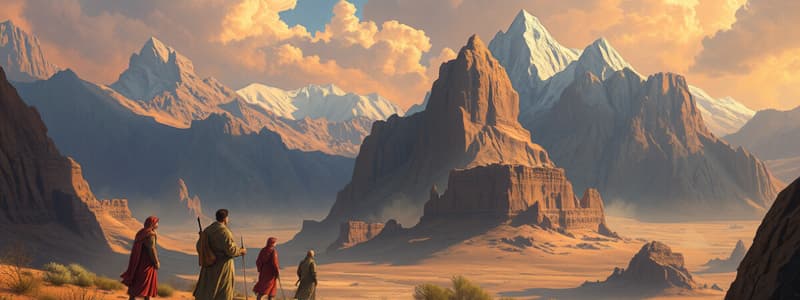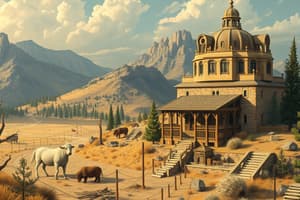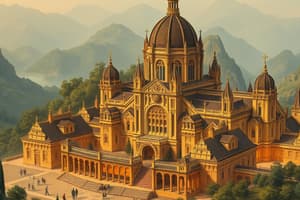Podcast
Questions and Answers
Who is known as the father of modern geography?
Who is known as the father of modern geography?
- Alexander Von Humboldt (correct)
- Eratosthenes of Cyrene
- Carl Ritter
- Friedrich Ratzel
Which of the following best describes geographical determinism?
Which of the following best describes geographical determinism?
- The idea that natural landscapes are immutable.
- The belief that physical environment shapes human culture and behaviors. (correct)
- The concept that geography has no influence on history.
- The theory that human activities shape the landscape.
Which two branches of geography are distinguished in the content provided?
Which two branches of geography are distinguished in the content provided?
- Cultural geography and Historical geography
- Physical geography and Biological geography
- Physical geography and Human geography (correct)
- Urban geography and Economic geography
What characterizes a natural landscape compared to a cultural landscape?
What characterizes a natural landscape compared to a cultural landscape?
Which ancient figure is credited with coining the term 'geography'?
Which ancient figure is credited with coining the term 'geography'?
Flashcards are hidden until you start studying
Study Notes
Definition and Origins of Geography
- Geography is a science focused on understanding Earth’s processes and features.
- The term "geography" comes from "GEO" meaning earth and "Graphos" meaning description.
- Eratosthenes of Cyrene is credited with coining the term and proving the Earth is round.
- Strabo authored "Geographica," a foundational text that introduced key geographical concepts.
- Ptolemy created maps and defined "Geographia," incorporating planetary order theories.
Historical Influences
- Marco Polo's travels in the 12th century contributed significantly to geographic knowledge in Europe.
- The modern concepts of geography emerged in the 19th century.
- Alexander Von Humboldt is often referred to as the father of modern geography.
- Carl Ritter emphasized the study of cultural, historical, and economic phenomena in geography.
- Friedrich Ratzel introduced the theory of geographical determinism, linking geography and human behavior.
Geographic Information Systems
- Geographic Information Systems (GIS) are vital tools for mapping and analyzing spatial data.
Multidisciplinary Nature
- Geography interacts with various fields such as ecology, urbanism, architecture, tourism, and history.
Branches of Geography
- Physical Geography: Studies natural features and processes of the Earth.
- Human Geography: Examines human interactions and impacts on the environment.
- Biological Geography: Focuses on the distribution of biological species across the Earth.
Geographic Phenomena
- Geographic phenomena are temporary processes occurring on Earth's surface.
- Geographic facts are the stable and permanent elements of the Earth's crust.
Landscapes
- Natural Landscape: Unaltered by human influence; shaped by soil, water, climate, and flora.
- Cultural Landscape: Altered or created by human activities; influenced by population, production, and communication patterns.
Studying That Suits You
Use AI to generate personalized quizzes and flashcards to suit your learning preferences.




